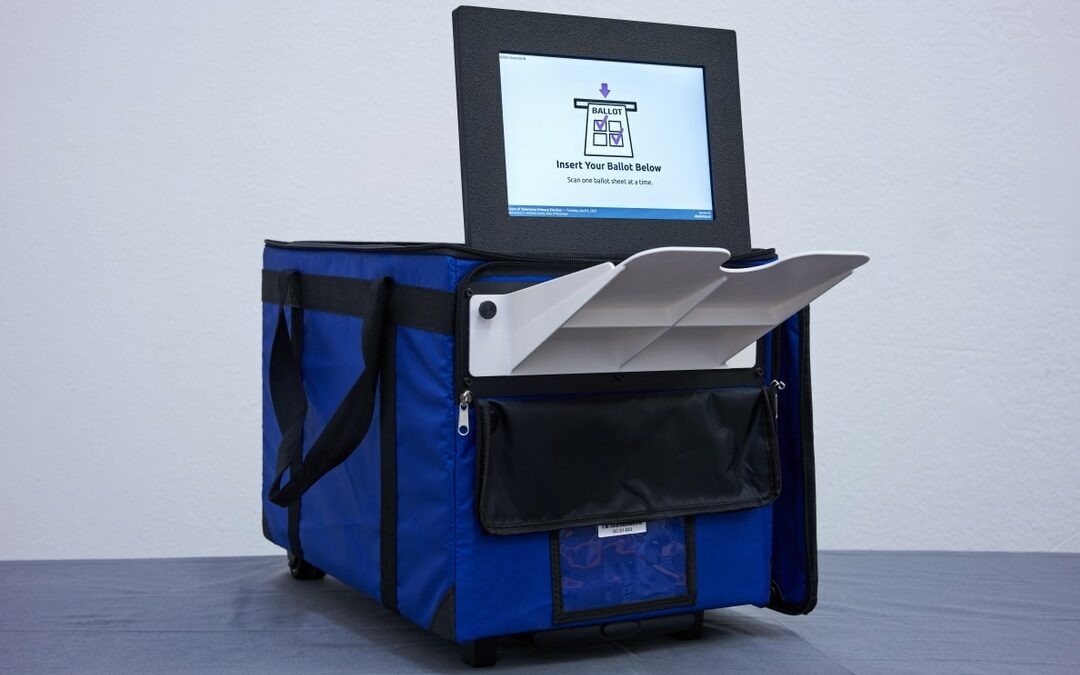Voters in three small New Hampshire towns will be putting their ballots into a new type of counting machine Tuesday – one that runs on open-source software rather than company-controlled software – in a pilot project to see whether digital transparency can increase confidence in the reliability of elections.
“In 2018, 2019, this was not a very important topic. Nobody talked about voting machine source code. Then 2020 happened and suddenly many people were talking about voting machine source code,” said Ben Adida, a co-founder of VotingWorks.
The nonprofit makes the ballot-scanning machines that will be used in the North Country towns of Ashland and Woodstock and the Seacoast town of Newington on Nov. 8. They are already being used in several Mississippi counties.
“The hope is this will give some confidence to voters that have questions and doubts now,” said Secretary of State Dave Scanlan. “To the extent that parts of the process aren’t transparent, that allows people to use their imagination … about what is happening.”
The VotingWorks devices will digitally scan and tally results from the same hand-marked paper ballots that are used for the state’s AccuVote machines. After Tuesday’s election those ballots will be taken to Concord for a hand recount by the Secretary of State’s office to double-check the device accuracy.
The towns were chosen because they are among the smallest in the state that already use ballot-counting machines. Their combined population is less than 3,000. The towns’ AccuVote machines will be available for backup if anything goes wrong, and a hand-counted audit of the results was scheduled after the election to see how well the VotingWorks machines did.
New Hampshire has been looking for years to buy replacements for the AccuVote machines that have been used for three decades. They run on the long-unsupported operating system Windows XP, and no parts are made for them any more. Repairs can only be done by cannibalizing other machines, including many bought from other states that have stopped using them.
Adida argues that switching to machines running on the open source software known as Linux, which can be examined by anybody, makes it harder for conspiracy theories to thrive about the reliability of the machines.
“Voting officials are very open and transparent about everything else they do. Then you’ve got this equipment they use that’s about as secretive as it can be,” he said. “It’s a good idea to make everything in the voting system transparent.”
Any decision about changing the devices which towns and cities can use for elections will be made by the Ballot Law Commission, a 10-person body whose members are appointed by the legislature and the governor. Scanlan said there’s no specific timeline for replacing the AccuVote machines, although a representative from LHS Associates, which services the machines, warned during a 2019 presentation to election officials that repairs and software fixes could become untenable in just a few more elections.
The three-town VotingWorks pilot project is free to New Hampshire. Adida estimated that the devices, which are assembled in California, would cost about $6,000 each.
The major difference for voters between the VotingWorks machines and AccuVote machines is that the new machines have a screen which displays information about the ballot after it has been inserted. This includes warnings about errors on the ballot such as over-voting, or casting a vote for too many candidates in a given race. This gives the voter the option to get the ballot back and place it in a separate bag where it will be hand-counted after polls close.
Election watchers have warned about organized efforts to deliberately overvote in some races as a method of slowing down election-night counts and casting doubt on the voting process.
Because it digitally scans the ballot and records a full image, the VotingWorks machines “is able to analyze checkmarks a little more precisely,” Adida said. It also records an image of any write-ins allowing election officials to see them on a screen. “The on-screen adjudication process is significantly more convenient and faster for clerks and moderators.”
Adida said the software in a VotingWorks machine is roughly similar to the Chromebook computer made by Google with the notable difference that it cannot be connected to the internet. Any changes or updates to the software must be done in person, loaded into each machine from a hand-held device.
VotingWorks, which has 15 employees scattered around the country, is supported by a combination of donations, grants and income from government contracts doing election audits. Adida said that the plan is to grow the company based on sales of vote-tallying machines. It also makes a device that allows voters to mark paper ballots from a touch screen instead of using a pencil as is done in New Hampshire.
Adida said that while it’s distressing to see continuing efforts to discredit America’s elections and undermine democracy, it does have the effect of focusing people’s attention.
“The silver lining is that over time people become more educated about how the voting system works,” he said.


 Return to the Concord Monitor
Return to the Concord Monitor